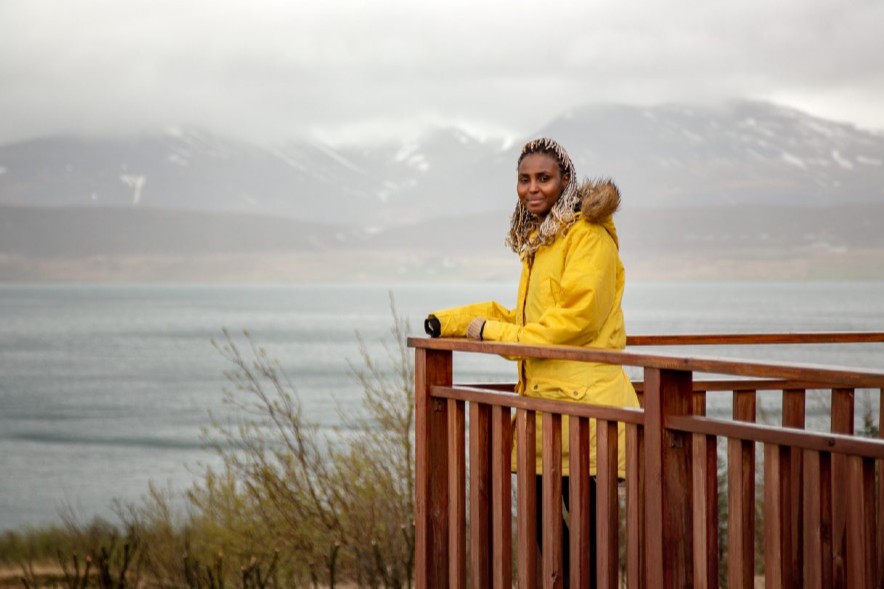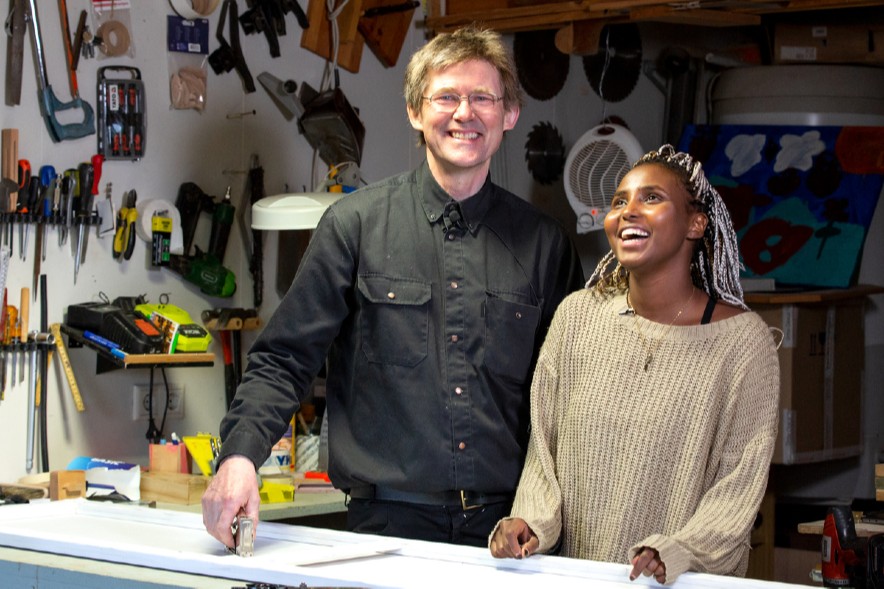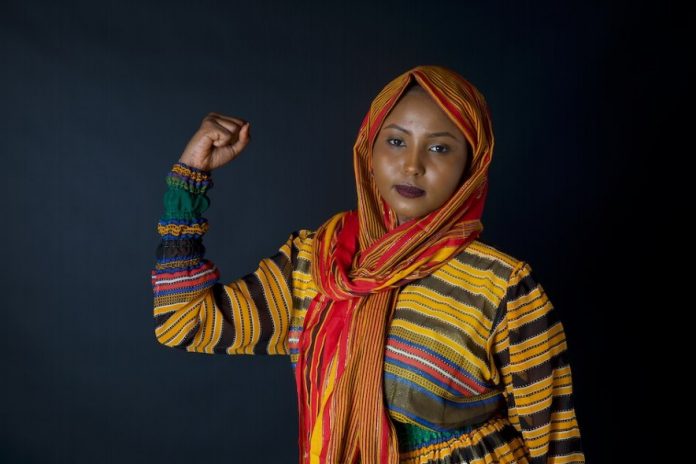Najmo Fyiasko is a cheerful and upbeat Somali woman, but at 21 she has experienced many things that no girl should have had to endure: female genital mutilation, forced marriage at 11, being wounded in a civil war and exile from her homeland.
However, Najmo Fiyasko Finnbogadóttir laughs and makes jokes while telling her story. A story that is heartbreaking, and sadly all too common in her native Somalia and in many other countries around the world.
“It all started with a mad girl who talked about what interested her,” laughs Najmo Fiyasko Finnbogadóttir from her bedroom in a flatshare in London. Inquisitive and always searching for answers, Najmo has always asked the question: Why? Why are little girls’ genitalia mutilated on the insistence of their families? Why are 11-year-old girls married to men thrice their age? Why do women make their daughters go through harmful rituals, when they themselves have suffered the same fate?
“I always had so many questions in my head. And I could never get an answer,” Najmo says.
Najmo was born in Somalia in 1998 as one of nine siblings. Her father was murdered when she was only eleven, and Najmo’s uncle decided she should marry her 32-year-old cousin. According to Najmo there is a common belief in Somalia that women should marry early because they need a man to protect them. The UN considers child marriage a human rights violation and according to UNESCO, 45 per cent of Somali women are married before the age of 18.
“My whole family were campaigning for my marriage,” remembers Najmo, “What surprised and hurt me the most, was that women surrounded me – my aunts, my neighbours, everyone – and no one helped me. The women were pushing me to accept it, and I was only a little girl.”
After the marriage, her brother helped Najmo escape to Mogadishu where she spent two years in hiding until a terrorist attack wounded both of her legs. Najmo’s family found her at the hospital and her uncle insisted she should return to her husband. Instead, with the help of her cousins, Najmo fled to relatives in Sudan. She was advised to go to Europe and joined a human smuggler ring on a 28 days track across the Sahara Desert, through Libya and across the Mediterranean Sea in a small boat.
“We went through hell, Najmo recalls, “My good friend died, actually.”
Najmo ended up in a refugee camp in Malta. There a Somali man living in Germany complimented her on her beauty.
“Men like this will target vulnerable women. He said: ‘I want to marry you.’ In our culture, you have to pay the bride’s family. He said he wanted to be in contact with them and send them money to arrange the marriage. I said: ‘Why don’t you send it through me?’ He sent me the money, and that’s the last time he heard from me,” Najmo laughs.
After being in transit in Germany and Denmark, Najmo was given a fake Belgian passport and told to board a plane to Canada. The plane would make a stopover in Iceland, and she was advised to leave the plane and act like she was one of the tourists. But Najmo was lost. She only spoke Somali, had only 70 Euros in her pocket and had never seen snow before. She was quickly detained by Icelandic authorities and taken to childrens services. Najmo was 16 years old and had spent three years on the journey from Somalia.
Icelandic authorities asked what she wished for. “Give me a family and education. The rest I can do for myself,” she answered.

“I use every opportunity to raise awareness”
Najmo was placed in a foster family and she quickly developed a close bond to her foster father, Finnbogi. Najmo was surprised by the things she saw in her new home. At every office she visited she saw women working. Girls were dancing and going to the gym and free to live their lives the way they wanted.
“Iceland was eye-opening for me. I had been with Somali people my whole life, but when I came to Iceland, I could see all the wrong things we do. I sat in my room every day and asked myself: “What can I do at the moment?” I was just a student so there wasn’t much I could do. But I thought: “What if I go on social media and share my opinion with everyone who wants to listen?”
Najmo began uploading videos on social media where she spoke frankly in Somali about the topics that interested her: child marriage, female genital mutilation, and rights for women and girls. Her foster parents supported her dream, and set up a little studio in her room in Iceland. Najmo’s Facebook and YouTube channels grew, and she now has more than 75 000 followers.
“I use every opportunity to raise awareness,” says Najmo, “These girls are like us. They want what we want. Good clothes, make-up, to go out, to have fun. But they have children.”

“Men can live with their wives for 20 years and never see her private parts”
By the time of her marriage, Najmo had already been subject to female genital mutilation (FGM) – the partial or total removal of the external female genitalia. FGM is deeply ingrained in Somali culture, and 98 per cent of Somali women have undergone the procedure. Girls who have not undergone the procedure are thought to be unclean, and few men wish to marry a woman who has not been subject to the practice. The ritual is usually performed by a local woman, using knives, scissors or razor blades to remove parts of the genitalia while female family members pin the girl down on the floor.
While being used to telling her story frankly and openly, Najmo still works on building enough confidence to discuss the most painful details of her life, like the trick her uncle played on her before her marriage:
“My uncle said to me that no man would ever touch me before I turned 13. But that was not the case. The first night – [my husband] didn’t even blink before raping me. When you have undergone FGM, you can’t walk for three or four days after having sex the first time.”
Many men are unaware of how damaging FGM is to women’s health and wellbeing. While the procedure itself takes less than half an hour, the consequences last a lifetime. After the ritual, girls may experience infections or excessive bleeding, and will, for the rest of their lives, experience labour complications and problems passing bodily fluids.
“Men can live with their wives for 20 years and never see her private parts,” says Najmo, “They don’t actually know how it looks because of religion and culture. You have to be shy when you are sleeping with your wife. You have to turn off the light. So, I use a model.”
The model Najmo talks about, is a life-size model of a woman’s genitalia. FGM is divided into four subcategories depending on the seriousness of the procedure, and the most severe form involves the total removal of the clitoris, labia minora and severing of the inner side of the labia majora. The sides of the labia majora are stitched together, leaving only a small hole to allow urine and menstrual blood to pass. Nearly two-thirds of girls in Somalia endure this form of FGM.
“I use the model and say this is how it’s done, and in the end, I say: “Mom, why are you doing this to me? Why are you hurting me?” Many mothers message me and say: “We didn’t know. My mother did it to me. My grandmother did it to her.” Fathers message me and say: “We didn’t know the process was this way. We are not going to allow our wives to do this anymore. The women aren’t doing it because they hate their daughters. They are doing it to please men.”
Najmo’s emotional approach touches many people, but resistance to change is strong. It is not easy changing deep-rooted culture practices, and Najmo has received many death threats accusing her of being too Western, and bringing shame upon her family. Some of her close friends tell her to be careful, but there are so many topics she wishes to discuss.
“I get threats, but I don’t care about it. I go wherever I want. I mean, who’s going to kill this crazy girl anyway, when there are so many other important people?” Najmo muses.
Always very concerned about the right way to approach difficult cultural subjects, Najmo speaks a lot about the best way to communicate with her target audience.
“In every community there is a way to approach, but it can’t have a deadline. Then you waste time and money. You need to speak their language and visualize. We need to show men the pain we are going through. And to educate mothers. We need to find a way to approach every community.”
“These girls are like us”
Since she first started making videos at her home in Iceland, Najmo has worked as a spokesperson at the European Week of Action for Girls to mark the International Day of the Girl Child, and the Amnesty International Nordic Youth Conference. Now she studies international business management at the University of West London, and has many plans for the future. With three other people she works on giving others what she has carved out for herself: a platform. The videos she made from her bedroom in Iceland have grown into a social media platform called MID SHOW. In the future, she hopes MID SHOW will expand to include several channels concerning the social topics Somalis are interested in.
“If you have a story you want to share from anywhere in the world, we will find a way for you to tell it,” says Najmo, “If you want to hide your face, we can do that. I get tired of people saying that I make up the stories. We want the victims to speak for themselves.”
Her long-term plan is to become the president of Somalia. Not because she wishes to become a leader, but because she wants to show that a woman is capable of anything. When asked how her life would have been, had she not managed to flee Somalia, Najmo sighs: “I would have accepted the situation like millions and millions of girls before me.”
The history of women’s liberation in the West gives Najmo hope that things will change in Somalia too. She can already feel that her social media campaigning is making an impact. She has experienced Somali women in their fifties and sixties coming up to her on the street, thanking her for her work and saying: “We have been silent for all our lives. Every word coming from your mouth are our words.”
She is also encouraged by all the men that support her. At the same time, she issues a warning to other men about staying silent: “Not all men are bad in Somalia, but the good men are silent, and as long as they remain silent, they are not good men.”
Change does not come quickly. Najmo’s father was an activist, and she wants to honour his memory through her work. She also knows she can’t do it all on her own. She calls for more people to join her in her work to fight discrimination against women and girls:
“If you think that other women are fighting for your rights for you, you’re wrong. Other women can encourage you, but you are the one that has to do the work. If you don’t, you will be forever where you are today, and your daughter will be the same.”
Additional links:
- More on Female genital mutilation (FGM): UNFPA | WHO
- Additional information on Child Marriage
- UNRIC Backgrounders: Somalia

